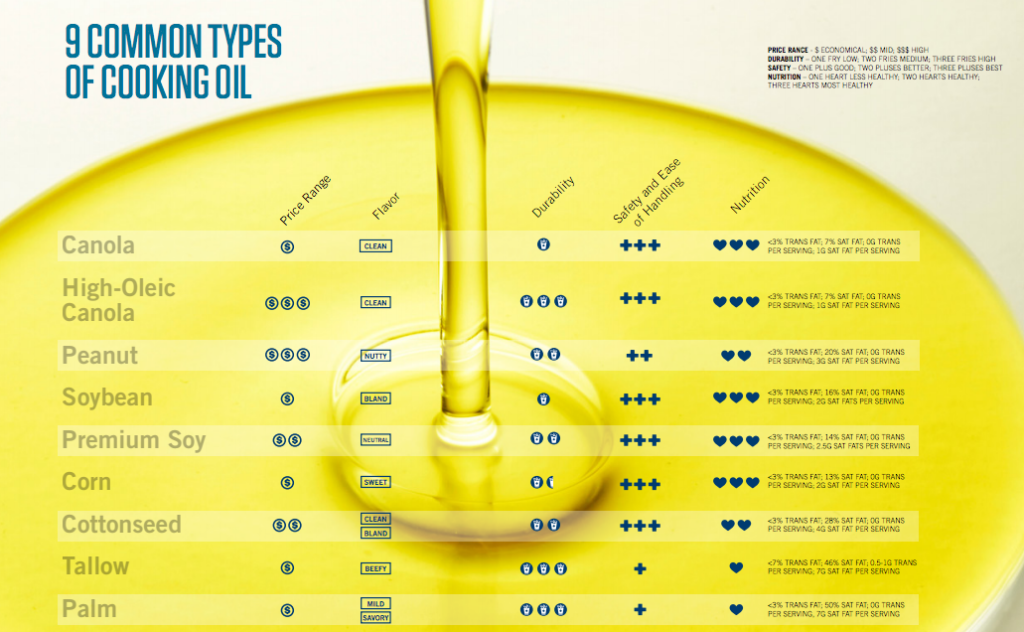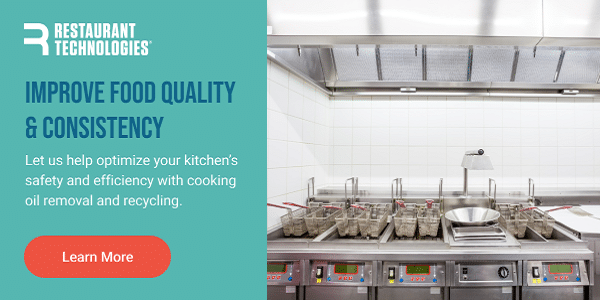
Updated Feb 19, 2024
In case you missed it, the U.S. Food and Drug Administration (FDA) recently approved the claim that soybean oil, one of the more common oils used for frying with 0 grams of trans fat, can reduce risk of coronary heart disease. This approval means the food industry is going to be able to leverage heart-healthy claims on food and menu items that contain at least 5 grams of soybean oil per serving. Such a move could attract consumers who make healthy food options a top priority. Here’s what you need to know:
- What is soybean oil? It’s the most commonly used ingredient in the United States and the top dietary source of omega-3 fatty acids. In fact, the United States is the world’s leading soybean producer – accounting for 33 percent of global production. So, it wouldn’t be surprising if the new heart-healthy claim boosts soybean farmers’ productivity and revenue.
- What kinds of food and menu items use soybean oil? Soybean oil is a popular ingredient in a variety of foods, thanks to its neutral flavor that doesn’t interfere with a food’s natural taste. Popular items that incorporate soybean oil include fried chicken, French fries, salad dressings, baked goods and crackers.
- What does this mean for consumers? Heart health is the number one thing consumers look for when grocery shopping, according to Hartman Group data. Fifty-five percent of U.S. consumers try to avoid or reduce saturated fat in their diets, and almost 40 percent try to consume healthy fats, like polyunsaturated fat and monounsaturated fats.

How Soybean Oil Stands Out
The buzz around soybean oil is expected to add a nutritional boost when it comes to cooking oil – the secret ingredient behind the taste, texture and appearance of our favorite fried foods. Is soybean oil heart healthy? Soybean is among the nine most common types of cooking oil, and its new heart-healthy claim might just make it more popular than ever before. Here’s how it compares to different oils most commonly used for cooking:
- Soybean is economical. Soybean is one of the more cost-savvy oil options. High-oleic canola oil, peanut oil, and premium extra virgin olive oil are the most expensive options.
- Premium soybean oil adds durability. Clear soybean oil, along with canola oil and corn oil, has a lower durability than solid oils when it comes to fry life. That’s where premium soybean oil gives you extra durability.
- Is soybean oil good for frying or deep frying? You can count on soybean for safety when it comes to fried food. Soybean oil is one of the safest and easiest types to handle when frying, whereas tallow and palm rank the lowest as a frying oil. Thanks in part to its liquid form, instead of solid, soybean oil can be managed through a closed-loop, automated system like Total Oil Management from Restaurant Technologies.
- Soybean scores an A for nutrition. Soybean is a healthier oil option with 0 grams of trans fat per serving and 3 grams of saturated fat per serving. With its new heart-health claim, consumers can wave off guilt by knowing there is nutritional value with this oil.
What is Unhealthy About Soybean Oil?
While soybean oil has gained recognition for its heart-healthy attributes, it also holds some unhealthy aspects worth balancing. One concern is the high omega-6 fatty acid content in soybean oil. While acids like omega 6 fat are essential for the body, an excessive intake of these fats can lead to an imbalance in the omega-6 to omega-3 ratio, which may promote inflammation and certain health issues when not balanced with omega-3s.
Is Soybean Oil as Healthy as Olive Oil?
Comparing soybean oil to olive oil is a common question when it comes to choosing cooking oils. While both oils have their benefits, they differ in terms of their fatty acid profiles. Olive oil is known for its monounsaturated fats, particularly oleic acid, which is associated with heart health. Soybean oil, on the other hand, is rich in polyunsaturated fatty acids, including omega-6 fatty acids. The choice between the two depends on individual health goals and cooking needs.
How Inflammatory is Soybean Oil?
The inflammatory potential of soybean oil largely depends on its omega-6 fatty acid content. Excessive consumption of omega-6 fatty acids, as found in soybean oil, can contribute to inflammation when not balanced with adequate omega-3 intake. It’s essential to maintain a balanced ratio of these fats in your diet to mitigate potential inflammatory effects.

Is Soybean Oil OK in Moderation?
Soybean oil can be a part of a balanced diet when consumed in moderation. While it offers heart-healthy benefits, it’s crucial not to rely solely on one type of oil. Incorporate a variety of cooking oils into your diet to maintain a balanced intake of different fatty acids, whether it be coconut oil, grapeseed oil, or the classic extra virgin olive oil. Moderation is key to enjoying the advantages of soybean oil without potential health risks.
The Ins and Outs of Soybean Oil
By understanding both the benefits and potential drawbacks of soybean oil, consumers and food professionals can make informed choices to support heart health while enjoying the culinary versatility of this cooking oil.
By staying abreast of trends influencing the industry, and having a better understanding of the type of oil purchased and how to manage it, food and restaurant professionals can leverage the heart-healthy benefits of soybean oil and its neutral flavor while still serving consumers delicious fried food.
Does your kitchen need an oil change? Download our free guide on selecting the right cooking oil for your restaurant.
Download our free guide on selecting the right cooking oil for your restaurant.







